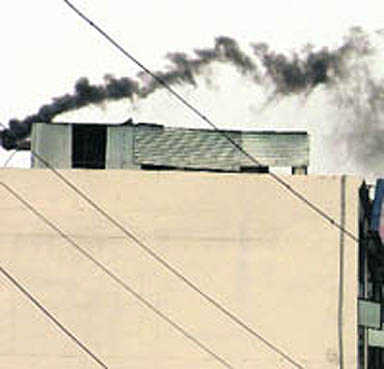
In New Delhi, levels of the most dangerous particles in the air are sometimes 10 times higher than the safe limit, a survey noted. Tribune file
New Delhi, May 2
As the pre-monsoon summer heat takes hold in the National Capital, two things are as inevitable as 40-degree-Celsius days: power cuts and air pollution from the diesel generators that then kick in.
But a team of Indian engineers has figured out away to bring some good from choking generator exhaust: They are capturing it and turning it into ink.
“The alarming thing about diesel generators is they are located in the heart of densely populated areas. It’s spitting smoke right there,” said Kushagra Srivastava, one of the three engineers who developed the technology, now installed in Gurgaon, a satellite city of New Delhi, and in the southern city of Chennai.
The idea, Srivastava said, came about when he and his co-founders stopped at a sugarcane juice stall on a hot day.
They noticed a wall that had turned black behind the stand’s diesel generator, where exhaust emerged from a pipe.
They wondered if diesel exhaust might be used to produce paint — and set out to try.
The device they came up with, which attaches to generators, captures 90 per cent of the soot particles from cooled diesel exhaust. The material can then be sold to ink manufacturers.
Their company, Chakr Innovation, has so far installed 50 of the devices for government firms such as Indian Oil, real estate developers and other state government offices, earning more than 11 million rupees ($2,00,000) in revenue in the first year, Srivastava said.
The company has plans to install another 50 devices over the coming year, he said. It has so far sold 500 kg of collected soot, which has been used to create 20,000 litres of ink, he added.
Chakr Innovations is not the first start-up to see cash in diesel exhaust. A competitor called Graviky Labs, based in Bangalore, is using similar technology to turn diesel exhaust from vehicles into ink.
Choking air
Srivastava and his co-inventors Arpit Dhupar and Prateek Sachan see themselves as part of a movement towards cleaner air and energy in a country where major cities struggle with choking air.
About 1.1 million people a year die from the impacts of air pollution in India, according to a 2015 survey by the US-based Health Effects Institute. That is about a quarter of the total number of air pollution deaths worldwide, it said.
In New Delhi, levels of the most dangerous particles in the air are sometimes 10 times higher than the safe limit, the survey noted.
Srivastava and Dhupar both grew up in New Delhi, which the World Health Organisation in 2014 declared the most polluted city in the world. Sachan comes from Allahabad, the third most polluted city in WHO’s 2016 rankings.
“Earlier I remember there were a lot less cars on the road, there was a lot less congestion, and a lot more greenery,” said Dhupar, Chakr’s chief technology officer.
But as trees were felled and roads widened to accommodate more cars, Dhupar – then in high school – developed chronic respiratory problems. Doctors put him on medication and warned him to stop playing sports.
“My problem is, whenever I start to run out of air, the anxiety levels shoot up,” he said.
Dhupar said many of his family and friends have also developed long-term respiratory issues.
Diesel exhaust contributed to just 2 per cent of all air pollution deaths in India in 2015, according to the Health Effects Institute.
But in “confined spaces” in urban areas, where many generators are used, it represents a larger risk, said Pankaj Sadavarte, one of the report’s researchers.
Action in New Delhi
The country has in place policies to monitor and restrict air pollution, but they can be difficult to enforce, experts say.
Worries about air pollution are growing, however. Last November, the National Capital launched its first air quality emergency action plan during a particularly hazardous week when pollution spiked.
The government halted construction within the city, raised parking fees to discourage driving and shut schools to keep children indoors.
The Ministry of Environment, Forest and Climate Change is drafting a national policy to clean India’s air, though its release has been delayed, said Sunil Dahiya, a senior campaigner with Greenpeace India.
“The air pollution debate and health debate is picking up in India,” Dahiya said in a telephone interview. “That momentum is forcing the policymakers to make our cities more livable.” (Thomson Reuters Foundation)



























